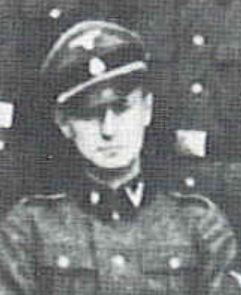Eberhardt, Georg
- Date of birth:
- February 27th, 1914 (Frankenhausen/Thuringia, Germany)
- Date of death:
- July 21st, 1943 (North of Andrejevka, Savodskoje/Ukraine, Soviet Union)
- Buried on:
- German War Cemetery Uspenka
Grave: UNK. - Service number:
- SS-Nr.: 36.334 // NSDAP-Nr.: 1.191.427
- Nationality:
- German
Biography
Promotions:
20.04.1936: SS-Untersturmführer
11.09.1938: SS-Obersturmführer
15.10.1942: SS-Hauptsturmführer
01.05.1943: SS-Sturmbannführer
Career:
00.11.1932: Allgemeine SS
00.00.1934: SS-Verfügungstruppe
00.00.1935: SS-Junkerschule Tölz
20.04.1936: promoted to SS-Untersturmführer
00.05.1936: Zugführer then Taktiklehrer SS-Junkerschule Tölz then SS-Junkerschule Braunschweig
11.09.1938: promoted to SS-Obersturmführer
00.12.1938: Stab, Reichsführers-SS
00.00.1941: Chef, 1. Kompanie, SS-Regiment 'Nordland', SS-Division "Wiking"
05.02.1942: Chef, 12. Kompanie, SS-Regiment 'Westland', SS-Division "Wiking"
15.12.1942-23.03.1943: SS-Hstuf, Kommandeur, I. Bataillon, Estnische SS-Legion
23.03.1943-21.07.1943: SS-Hstuf, Kommandeur, estn. Freiwilligen SS-Panzergrenadier-Bataillon "Narwa", 5. SS-Panzergrenadier-Division "Wiking"
01.05.1943: promoted to SS-Sturmbannführer, SS-Freiwilligen-Panzergrenadier-Bataillon "Narwa", 5. SS-Panzergrenadier-Division "Wiking"
21.07.1943: WIA by artillery fire while trying to carry one of his wounded men away from the frontline near Savodskoje, West of Isjum, Donez and DOW
Do you have more information about this person? Inform us!
- Period:
- Second World War (1939-1945)
- Rank:
- SS-Obersturmführer (Lieutenant)
- Awarded on:
- August 11th, 1941
- Period:
- Second World War (1939-1945)
- Rank:
- SS-Obersturmführer (Lieutenant)
- Awarded on:
- September 1st, 1941
- Period:
- Second World War (1939-1945)
- Awarded on:
- 1942
- Period:
- Second World War (1939-1945)
- Rank:
- SS-Sturmbannführer (Major)
- Unit:
- Kommandeur, SS-Freiwilligen-Panzergrenadier-Bataillon "Narwa", 5. SS-Panzergrenadier-Division "Wiking", Waffen-SS
- Awarded on:
- August 4th, 1943
“During the course of the defense against Russian breakthrough attempts along the middle Donez (west of Izyum) the Estonian Freiwilligen-Bataillon ‘Narwa’ was deployed for defense in the sector north of Andrejewka in the evening hours of the 18.07.1943.
This would be the first operation of the Bataillon, which had been created in the autumn of 1942 from Estonian volunteers of Germanic ethnicity.
In the time period 19.-21.07.1943 the enemy attacked the entire sector west of Izyum with heavy support from aircraft, artillery, Katyushas, heavy infantry weapons and numerous tanks. The main effort of the enemy advance was conducted out of the Ssemenowka bridgehead with two infantry divisions and a tank brigade, and was aimed in a southerly direction against Andrejewka. From here it was to carry on towards Barwenkowo. This thrust encountered the Estonian Freiwilligen-Bataillon ‘Narwa’. Over the course of a heroic battle the Bataillon fended off all the attacks of the enemy, which were conducted against its positions on a constant basis for three days. The majority of these enemy attacks were crushed via immediate counterthrusts. 34 tanks were also destroyed, the bulk of these in close combat.
The soul of the Bataillon’s resistance was its commander, SS-Sturmbannführer Eberhardt. He was the one who had worked tirelessly to create, train and bind together this Bataillon. Now, fulfilling his duties to the last, he personally led the decisive counterthrusts while demonstrating extraordinary bravery and swift initiative.
His attitude during the first Russian armoured attack was decisive for the future steadfastness of his young troops. In this engagement he personally jumped onto one of the first broken-in enemy tanks and destroyed it with a magnetic AT grenade.
On the 19.07.1943 the enemy launched a regimental-sized attack with tank support that penetrated along the boundary with the left neighbour. SS-Sturmbannführer Eberhardt immediately led a shock troop to this position and threw the enemy back in an immediate counterthrust.
At 03:00 on the 21.07.1943 the enemy succeeded in capturing the vital Hill 192.4 via a surprise thrust. SS-Sturmbannführer Eberhardt went to the point of penetration with 11 motorcycle troops and threw the enemy off this hill in a counterthrust.
At 12:30 on the same day the enemy penetrated into the sector of 1. Kompanie, a unit which had by now lost all its officers and almost all of its German NCOs. SS-Sturmbannführer Eberhardt rallied the handful of available reserves and threw the enemy back in a counterthrust. Here he fell in battle at the head of his men.
Despite heavy losses and major enemy action, the Bataillon had held its ordered position. The Russians called off their attacks on the 21.07.1943 due to the heavy losses that they themselves had sustained.
The Division recommends that this outstanding leader of men be awarded the Knight’s Cross to the Iron Cross. He was a shining example of devotion to duty for his troops to the last breath.”
Awarded posthumously.
Sources
- Photo 1:
- - FELLGIEBEL, W.P., Elite of theThird Reich, Helion & Company Limited, Solihull, 2003.
- MOONEY, PETER, Waffen-SS Knights and their Battles, Schiffer Publishing, Ltd., 2012.
- Microfilm Publication A3343. US National Archives. - Georg Eberhardt | Gräbersuche-Online
- TITLE
- TITLE






